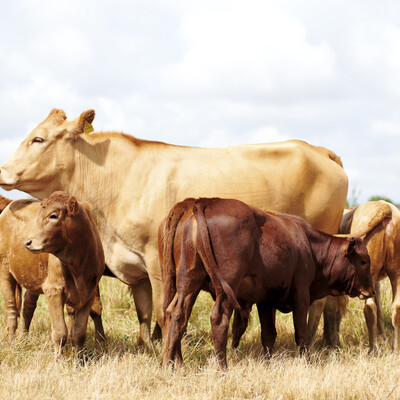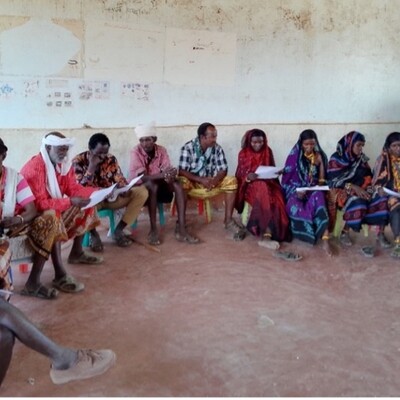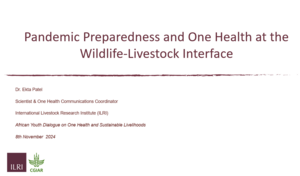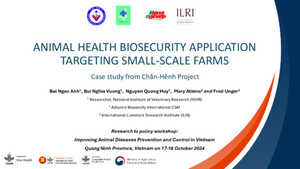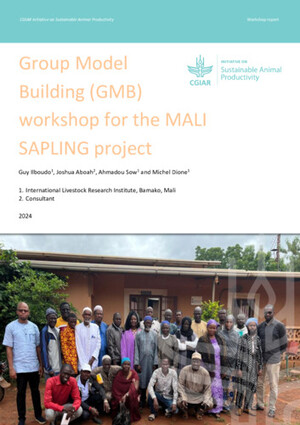
ILRI and ICAR 2023 annual review of progress of collaborative projects
The annual review meeting of the Indian Council of Agricultural Research (ICAR) and CGIAR collaborative projects was held on 6 February 2024. The hybrid meeting analysed the research progress in 2023 and outlined activities for 2024.
This year’s event acknowledged the positive impact of the innovations resulting from joint research between ICAR and CGIAR e.g. Harit Dhara, an anti-methanogenic compound that has the potential to reduce enteric methane emission. The meeting encouraged the inception of projects focused on commercialization and up-scaling of technologies with the private sector.
Following a November 2022 memorandum of understanding between ICAR and 12 CGIAR centres, including the International Livestock Research Institute (ILRI), ICAR and CGIAR have been working together on agricultural research and education in crops, livestock, fisheries, policy, land and water management, and agro-biodiversity.
This meeting of the heads of CGIAR centres in India and senior ICAR officers and the Department of Agricultural Research and Education (DARE) is held annually.
Himanshu Pathak, Secretary DARE and DG, ICAR, called for further reduction of overlaps, and share progress updates. Biennial review meetings to evaluate project progress are held between July and September every year.
‘Many success stories have come from the CGIAR-ICAR partnership and we look forward to even more achievements from our ongoing and future projects,’ said Appolinaire Djikeng, the director general of ILRI.
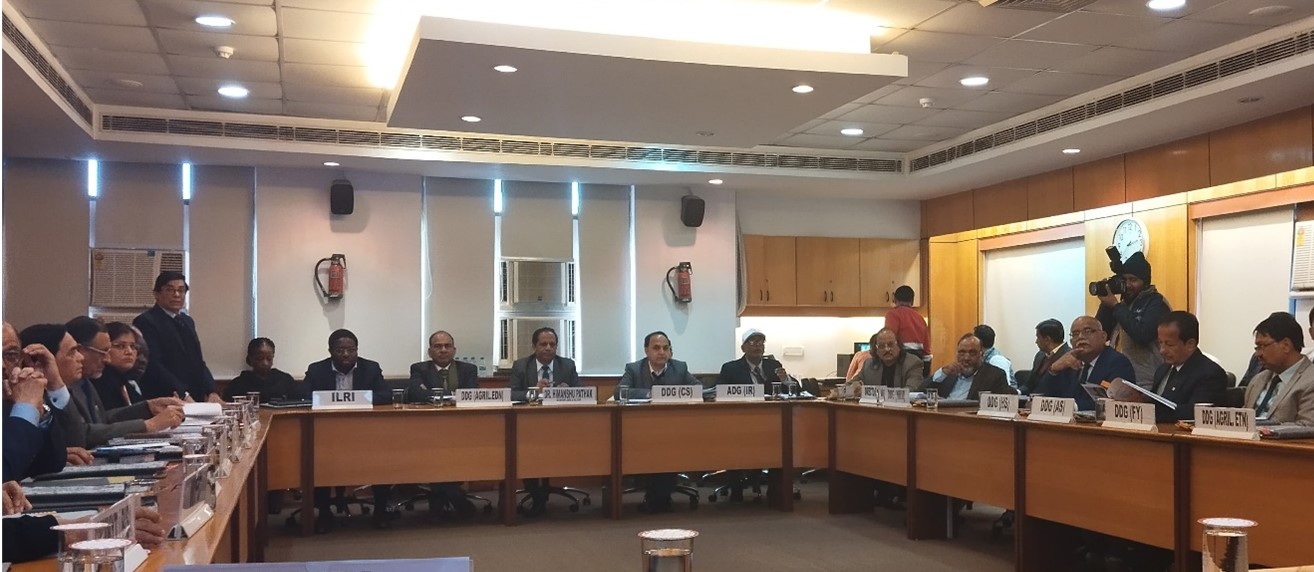
Participants from the CGIAR and ICAR participate in one of the sessions at the review meeting (photo credit: ILRI/South Asia).
CGIAR centres senior leaders presented their results of their ongoing work with ICAR, and plans for 2024. ILRI’s updates were shared by Habibar Rahman, ILRI regional representative for South Asia, and the principal investigators (PIs) of various projects in the country. ICAR–ILRI projects are being undertaken in four priority areas: (i) vaccine and diagnostics development; (ii) red jungle fowl (RJF) genomics; (iii) methane emission and its mitigation; and (iv) gender.
One of the highlights of the ICAR–ILRI collaboration in 2023 was the launch of the medium-density single nucleotide polymorphism (SNP) chip dubbed ‘Indichick’. Developed under the recently concluded backyard poultry genomics project, the chip can identify native chicken breeds to a specificity of around 97% and can also be used for genomic selection to improve economically important performance traits in native as well as improved chicken breeds.
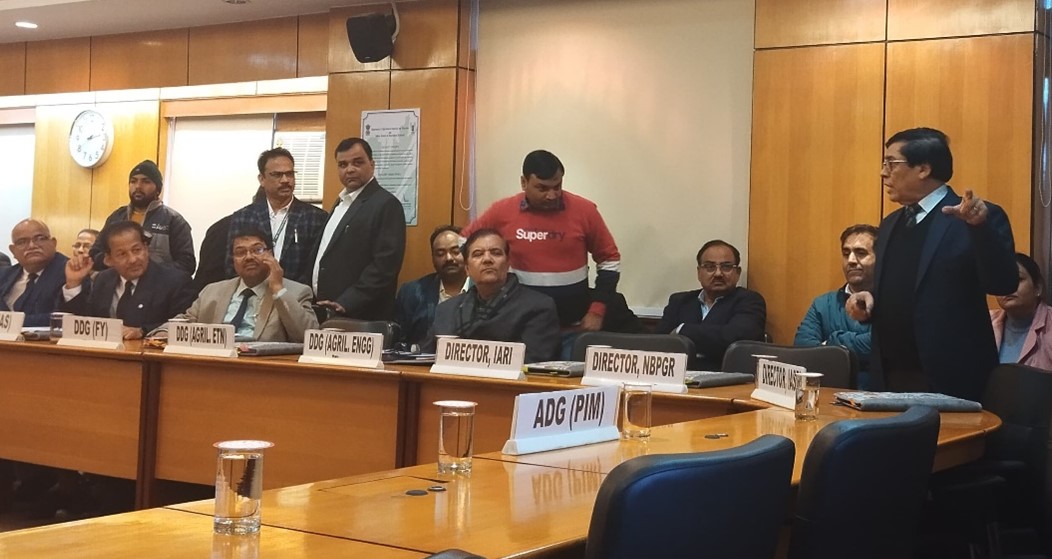
Habibar Rahman (right), ILRI regional representative for South Asia, at the ILRI–ICAR collaborative project review meeting (photo credit: ILRI/South Asia).
Pradeep Malik from the ICAR National Institute of Animal Nutrition and Physiology (NIANP), Bengaluru, whose team is studying methane emission and its mitigation presented how their research is reducing emissions from cattle fed on the common diets in Karnataka State through a combination of wheat straw and concentrate.
Rajukumar of the ICAR National Institute of High-Security Animal Diseases, Bhopal, presented the progress in the development of vaccines for prioritized exotic and emerging animal diseases, including African swine fever, Middle East respiratory syndrome and Rift Valley fever. Afterwards, Arun Kumar Panda, from ICAR’s Central Institute for Women in Agriculture, presented the project progress in the Gender-Livestock-Climate Analytic Approach (GLCAA) for livelihood improvement in distressed areas of India. Simmi Tomar, of ICAR Central Avian Research Institute, spoke about the red jungle fowl genomics project.
Also present at the review meeting were representatives from other CGIAR centres working in India, including International Crops Research Institute for the Semi-Arid Tropics (ICRISAT), International Food Policy Research Institute (IFPRI), International Center for Agricultural Research in the Dry Areas (ICARDA), International Water Management Institute (IWMI), International Potato Center (CIP) and International Rice Research Institute (IRRI). The next review meeting, for the 2024 projects, will be held at the beginning of 2025.
For more on ILRI’s work in India: https://www.ilri.org/where-we-work/south-asia/india
(The post was edited by Terry Mwenda, communications officer, publishing and editing, ILRI, and Paul Karaimu, communications officer, ILRI)





